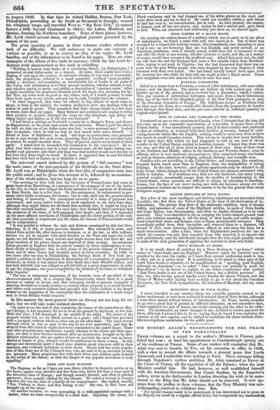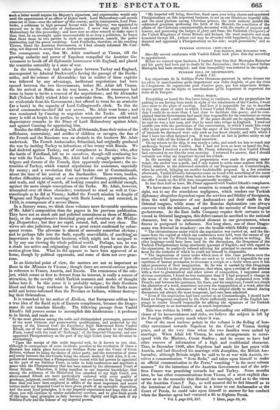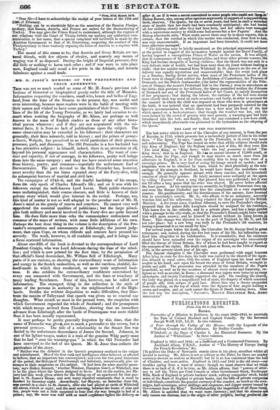SIR ROBERT ADAIR'S NEGOTIATIONS FOR THE PEACE OF THE DARDANELLES.
THESE volumes are a sequel to the author's Mission to Vienna, pub- lished last year ; at least his appointment to Constantinople sprung out of his residence at Vienna. Some of our readers will remember that Mr. Adair was sent to Austria by Fox, on his accession to office in 1806, with a view to second the efforts towards a general peace that Lords Yarmouth and Lauderdale were making at Paris. These attempts failing through Napoleon's restless ambition, Mr. Adair remained as Envoy at the Court of Vienna, till the expulsion of All the Talents ; when the new Ministry recalled him. He had, however, so well established himself with the Austrian Government, that Count Stadion by the Emperor's orders, wrote to the Ambassador in London directing his wish to be men- tioned to the King that Mr. Adair should not be removed. It now ap- pears from the preface to these volumes, that the Tory Ministry was not- withstanding resolved to withdraw him. But, "For special reasons easily to be understood, it was determined not to press on his Majesty my recall by a regular official letter, but to supersede me, inasmuch as, such a letter would require his Majesty's signature, and supersession would only need the appointment of an officer of higher rank. Lord esbury—all secrets come out in time—was the adviser of this course; and in consequence, Lord Pem- broke a nobleman in high personal favour with his Majesty, was appointed to succeed me in the character of Ambassador. I never was angry with Lord Malmesbury for this proceeding; and have now no other remark to make n it than that, by an oversight quite unaccountable in so deep a politician, he .rgot that there must be two parties to such an appointment, namely, the power nominating and the power receiving. Lord Pembroke, therefore, on his reaching Vienna, found the Austrian Government, as I had already informed Mr. Can- ning, not disposed to accept him as Ambassador.
The consequence was, that Mr. Adair continued at Vienna, fill the growing audacity and power of Napoleon compelled the Austrian Go- vernment to break off all diplomatic intercourse with England, and placed the countries ostensibly in a state of war.
In the interim, war had taken place between Turkey and England, accompanied by Admiral Duckworth's forcing the passage of the Darda- nelles, and the seizure of Alexandria : but as neither of these exploits was followed by any advantage, ineffectual negotiations had been opened between the two Governments, before Mr. Adair left Vienna. On his arrival at Malta on his way home, a Turkish messenger had come in haste to invite a renewal of the negotiations; and Sir Alexander Ball (Nelson's Ball) wished Adair to undertake them. He, however, had no credentials from his Government ; but offered to treat for an armistice (as a basis) in the capacity of Lord Collingwoocl's clerk. To this the naval commander-in-chief did not assent. Mr. Adair went home; and was nominated by Canning to negotiate with the Turks. All which story is told at length in the preface, in consequence of some unkind and depreciatory remarks in the Diary of Lord Malmesbury against Adair, and against Canning for appointing him. Besides the difficulty of dealing with all Orientals, from their union of the selfishness, uncertainty, and artifice of children or savages, the fear of the French and the Russians was an obstacle in the business Mr. Adair undertook. The French Ambassador, Sebastiani, had originally produced the war by inciting Turkey to infractions of her treaty with Russia. We had declared against Turkey, out of compliment to Russia; who, after the battle of Friedland, left us to ourselves, though still continuing her war with the Turks. Hence, Mr. Adair had to struggle against the in- trigues and threats of the French, then apparently omnipotent; the ne- cessities of Turkey, which wanted stipulations for assistance, especially for money; and a revolution that had broken out at Constantinople, about the time of his arrival at the Dardanelles. There were, besides, further difficulties arising out of our systems of finance, protection, colo- nial trade, and right of search, all looking complex and artificial enough, against the more simple conceptions of the Turks. Mr. Adair, however, triumphed over all these obstacles • continued to stand as well at Con- stantinople as he did at Vienna; baffled the French mission in despite of Wagram and Napoleon's marriage with Marie Louise; and returned, in 1810, in consequence of a severe illness.
In a literary sense, we think these volumes more favourable specimens of Mr. Adair's composition than the papers in his previous publication. They have not so much salt and polished naturalness as those of Malmes- bury, or the comprehensive historical grasp and elevation of the Welles- ky.Despatekes-' but they are rapid, rotund, full, and very clear. The views are also judicious, and were to a great extent confirmed by subse- quent events. The advocate is almost of necessity somewhat obvious ; and he perhaps falls into the fault, equally unavoidable, of ascribing', an importance to his particular business, which might not be assigned to it by any one viewing the whole political world. Perhaps, too, he was a shade too active and originating: but this would depend upon the dis- cretion given him. What he did appears to have been approved of at home, though by political opponents, and some of them not over gene- rous.
In an historical point of view, the matters are not so important as those in the Mission to Vienna; though there are several curious points in reference to France, Austria, and Russia. The remoteness of the sub- ject, which seems at first to detract from its interest, is really a source of attraction, by the novelty which Turkish manners and modes of thought infuse into it. In this sense it is probably unique • for their Northern blood and their long residence in Europe have rendered the Turks more solid and better-informed than the Persians or Indians, without destroy- ing their Orientalism.
It is remarked by the author of Eothen, that Europeans seldom have a true idea of the florid style of Eastern compliment, because the Drago- mans do not translate literally. The following passage from Vaahid Efendi's full powers seems to accomplish this desideratum : it professes to be literal, and reads so. "To the most glorious among the noble and distinguished personages, possessed of the most virtuous and praiseworthy qualifications, and protected by the mercy of the Eternal God: his Excellency Sejid Mehemmed Emin Vaahid Efendi, one of the noblemen of the Ministerial line attached to my Sublime Porte, vested with the rank of Nishangy; of the Imperial Chancery, and now appointed Plenipotentiary on the part of my high Court (may his elevation be everlasting). "Upon the receipt of this noble imperial writ, be it known to you that, although in consequence of some incidents peculiar to the revolution of times a disunion has taken place between my Sublime Porte and the Court of Great Britain, without its being the choice of either party, and the restoration of peace and amity between the two Courts being the sincere desire of both sides, it is ex- pedient and necessary that a Plenipotentiary vested with full powers be appointed on the part of my Sublime Porte, in order to hold conferences and negotiate a peace with the Plenipotentiary that has been named by the aforenamed Court of _Great Britain. Wherefore, it being manifest to our imperial knowledge, that among the noblemen of the Ministerial line attached to my high Court, you above-named Efendi are more particularly endowed with every quality of prudence, judgment, rectitude, and fidelity, and are known in the long coarse of time that you have been employed in affairs of the most important and secret nature under my Imperial Court to have given proofs of an agreeable disposition, and the most loyal principles, it is our imperial expectation and hope that at all times you will continue to render satisfactory services, and to give fresh proofs of the same loyal principles as duly . becomes the dignity and high rank of my Sublime Porte and the honour of my imperial person. "My imperial will being, therefore, fixed upon your being chosen and appointed Plenipotentiary on this important business, to act on our illustrious imperial side, and the most glorious among Christian princes, the most eminent amidst the celebrated grandees professing the faith of the Messiah, the conciliator of the affairs of the Christian commonwealth, decorated with the marks of majesty and honour, and possessing the badges of glory and fame, the Padishah (Emperor) of the Umted Kingdoms of Great Britain and Ireland, the most majestic and most honoured George III., (whose end may be attended with happiness,) having also deputed and appointed a Plenipotentiary on his side; ample permission," and so forth.
TURKISH OFFICIAL CHIT-CHAT.
Port Barbieri, 26th November 1608.
Sir—My second conference with Vaahid Efendi took place this day according to appointment.
Before we entered upon business, I learned from him that Mustapha Bairactar and his party had been put to death by the Janissaries; that the deposed Sultan Mnstapha had been strangled; and that tranquillity was restored in the capital.
TURKISH IDEA OF RECIPROCITY.
Article VII.
Les ntociants de la Sublime Porte Ottomane payeront la meme douane Bur lea effets et merchandises gulls importeront aux Etats Anglois, et .que des Rats de l'Angleterre ils exporteront pour d'autres pays, quo less negociants Brits's- piques payent sur lea objets et merchandises qu xis importent et exportent des etats de Is Turquie.
FINAL TRICK.
Everything on board the Sea-horse being in readiness and the preparations kir putting to sea having been made in sight of the inhabitants of the Castles, I went once more to the place of meeting. And here it is impossible for me to describe to you the state of mind in which I found Vaahid Lfendi. He fairly confessed that I could do no more than I had done to facilitate this peace; and he com- plained that his Government had made him responsible for its conclusion on terms which he owned I could not admit. If the peace should not be signed, therefore, he said he was a lost man, and that he must take refuge in England. I need not trouble you with the particulars of this conversation, in which I made him every offer in my power to secure him from the anger of his Government. The topics of business we discussed were only such as you know already, and with which I fear I have too often fatigued you. It was closed at la.st in pesfect amity on my part, but with all the forms of a final interview. On my return to the ship, it was nearly a calm, and much too late to reach any anchorage beyond the Castles. But I had not been an hour on board the Sea- horse before I received a note from Mr. Pisani informing me that Vaahid Efendi had entreated to see him the next morning. I returned for answer, that I should certainly not delay my departure beyond ten o'clock.
In the morning at daylight, all preparations were made for getting under weigh: the anchor was a-peak and I only waited to settle some matters with Mr. Pisani relative to the distressed situation of our Dragomans at Constantinople, when he arrived, bringing me another inadmissible proposal. In a few minutes afterwards, Vaahid Efendi a interpreter came on board with something of the same nature. On this I ordered them both to leave the ship, and not to return except the offer I made on the 27th were unequivocally accepted. In less than half an hour, Mr. Pisam appeared with Vaahid Efeiuli's compliance.
We have more than once had occasion to remark on the strange over- sight, not to say the scandalous negligence, which renders our Turkish diplomacy altogether dependent upon the services and fidelity of foreigners, from the total ignorance of our Ambassadors and their staffs in the Oriental tongues, while some of the Russian diplomatists can always converse with the ministers, and supersede the necessity of these lingual go-betweens. As the East India Company require their servants to be versed in Oriental languages, this defect cannot be ascribed to the national character, but to the aristocratical element in our government, where fitness is postponed to influence. Not long since, one of these Drago- mans was detected in treachery: see the trouble which fidelity occasions. "The circumstances under which the negotiation was carried on, and the dis- tance from the capital at which our conferences were held, were the causes of mij consenting to use the French language in reducing the articles to writing. No other language could have been used for the discussions, the Dragoman of the Turkish Plerupotentiary being absolutely ignorant of Fnighsh; and with regard to the signatures, he positively refused advising his principal to execute an monu- ment for the contents of which lie could not himself be responsible. " Theimpressions of terror under which men of this class perform even the most ordinary functions of their office are such as to render it impossible for any exertions of human persuasion to overcome a scruple or a doubt when once it has taken possession of their imagination. So far was it carried by this Dragoman (who is a Greek) in the present instance, that when, upon a revisal of the articles with a view to grammatical and other errors of composition, I suggested 801110 obvious corrections, I found no less resistance than if I had proposed a change in the sense of the articles themselves. He was but little acquainted even with French; and between his ignorance, his fears, and his suspicions, I could not obtain the alteration of a word, sometimes not even the transposition of a word, after the article itself, to the substance of which I was obliged chiefly to attend during discussions not always the most temperate, had once been admitted. "Even if the negotiation had been carried on at Constantinople, I should have found no Dragoman employed by the Porte sufficiently master of the English lan- e to render himself responsible for affixing the signature of the Turkish Plenipotentiary to an instrument of so much importance'
This was written in 1809; and, notwithstanding our additional expe- rience of its inconveniences and risks, we believe the subject is left by the Foreign Office pretty much where it was.
One of the most curious points in the volume is the feeling of hos- tility entertained towards Napoleon by the Court of Vienna during peace, and at the very time when the two families were united by marriage. When Adair left Vienna, he made arrangements to corre- spond with the Minister, Count Stadion and he seems to have had other sources of information of a high and confidential character. Thus, in December 1809, after Napoleon had made his last peace with Austria, and had dissolved his marriage with Josephine, the British Am- bassador, although Britain might be said to be at war with Austria, re- ceives a communication "from Buda," and takes upon himself to make an official communication to the Porte,* vouching "in the most solemn manner" for the intentions of the Austrian Government and of the arti- fices France was practising towards her and Turkey. Some months later, he has other communications from Vienna, of a most explicit cha- racter as to the necessity that dictated the marriage, and as to the views of the Austrian Court.-I. Nay, so well assured did he feel himself as to the intentions of that Court, that in a letter to our Ambassador at the Court of Persia, he could take upon himself to answer for her condnct when the Russian agent had ventured a fib to frighten Persia.
• Vol. L page 816, 817. t 'demi Page 89, 911
"Peru, 27th March 1810.
"Dear Sir—I have to acknowledge the receipt of your letters of the 12th and 111th of February.
"Nothing can be so absolutely false as the assertion of the Russian Plenipo- tentiary, that Russia, Austria, and France are united for the dismembering of Turkey. You may give the Prince Royal to understand, although the rupture of tour relations with the Court of Vienna forbids my making any authorized corn- aimnication in her name, that a special complaint will forthwith be made by the Austrian Government to that of St- Petersburg, respecting the conduct of this Plenipotentiary in thus wantonly exposing the house of Austria to a rupture with Turkey." The moral of this seP..ms to he, that Austria and Great Britain are na- *ma friends, with few objects of rivalry, and scarcely any means of waging war if so disposed. During the height of Imperial pressure, they Aid little or nothing to harm each other ; and if war were to take place now, England could only assail a few ports in the Adriatic, and Austria fulminate against a small trade.




























 Previous page
Previous page